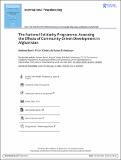The National Solidarity Programme: Assessing the Effects of Community-Driven Development in Afghanistan
Author(s)
Beath, Andrew; Enikolopov, Ruben; Christia, Fotini
DownloadThe National Solidarity Programme Assessing the Effects of Community Driven Development in Afghanistan.pdf (473.7Kb)
PUBLISHER_CC
Publisher with Creative Commons License
Creative Commons Attribution
Terms of use
Metadata
Show full item recordAbstract
Over the past two decades, community-based approaches to project delivery have become a popular means for governments and development agencies to improve the alignment of projects with the needs of rural communities and to increase the participation of villagers in project design and implementation. This article briefly summarizes the results of an impact evaluation of the National Solidarity Programme (NSP), a community-driven development programme in Afghanistan that created democratically-elected community development councils and funded small-scale development projects. Using a randomized controlled trial across 500 villages, the evaluation finds that NSP had a positive effect on access to drinking water and electricity, acceptance of democratic processes, perceptions of economic well-being and attitudes towards women. Effects on perceptions of local and national government performance and material economic outcomes were, however, more limited or short-lived.
Date issued
2015-08Department
Massachusetts Institute of Technology. Department of Political ScienceJournal
International Peacekeeping
Publisher
Taylor & Francis
Citation
Beath, Andrew, Fotini Christia, and Ruben Enikolopov. “The National Solidarity Programme: Assessing the Effects of Community-Driven Development in Afghanistan.” International Peacekeeping 22.4 (2015): 302–320.
Version: Final published version
ISSN
1353-3312
1743-906X